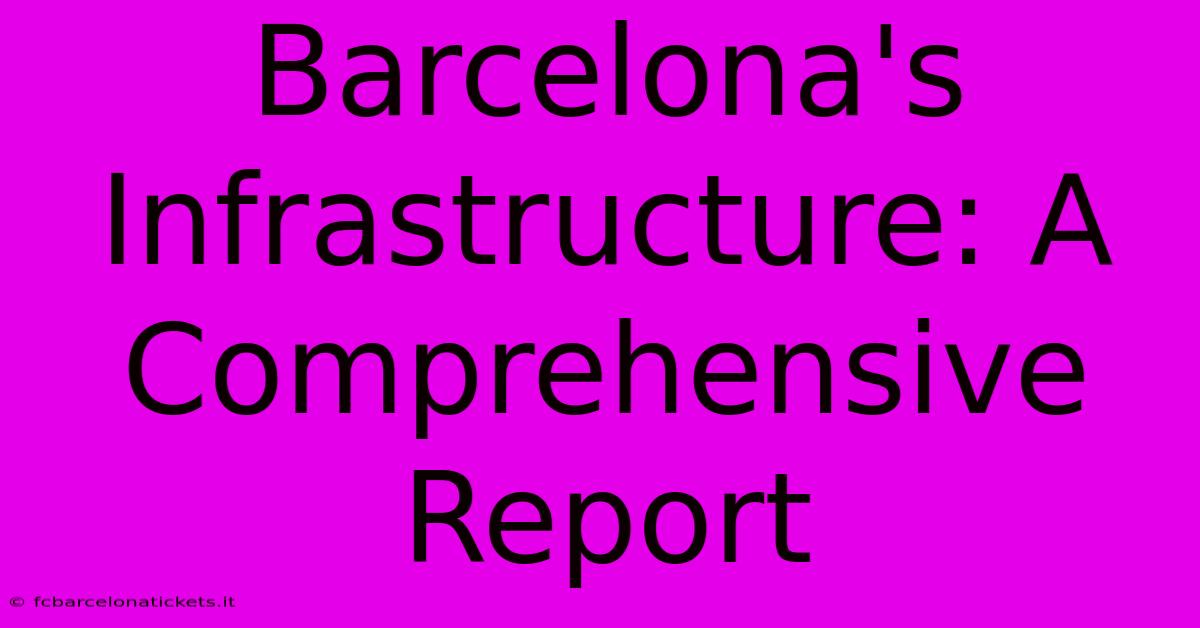Barcelona's Infrastructure: A Comprehensive Report

Table of Contents
Barcelona's Infrastructure: A Comprehensive Report
Barcelona, a vibrant cosmopolitan city on the Mediterranean coast, boasts a sophisticated and extensive infrastructure network supporting its bustling economy and thriving population. This report delves into the key components of Barcelona's infrastructure, highlighting its strengths, weaknesses, and future challenges.
Transportation Network: A City on the Move
Barcelona's transportation system is a crucial element of its infrastructure, designed to efficiently move both residents and tourists.
Public Transportation: The Backbone of Mobility
Metro: Barcelona's metro system is a highly efficient and extensive network, reaching all corners of the city and its surrounding areas. Its frequency and accessibility make it a preferred mode of transport for commuters and visitors alike. Regular upgrades and expansion projects ensure its continued effectiveness.
Bus Network: Complementing the metro, Barcelona's bus network provides comprehensive coverage, especially to areas not directly served by the subway. The integration of bus and metro lines ensures seamless travel throughout the city. Improved accessibility features for passengers with disabilities are continuously being implemented.
Tram: The tram system, while smaller than the metro and bus network, plays a significant role in connecting specific areas and reducing congestion. Modern trams offer comfortable and efficient travel.
Roads and Highways: Connecting Barcelona to the World
Barcelona possesses a well-developed road network, facilitating both local and long-distance travel. Major highways connect the city to other parts of Spain and Europe. However, traffic congestion remains a significant challenge, particularly during peak hours. Smart traffic management systems are being implemented to mitigate this issue.
Port of Barcelona: A Gateway to the Mediterranean
The Port of Barcelona is a critical component of the city's infrastructure, serving as a major hub for maritime trade and tourism. Its modern facilities and strategic location contribute significantly to Barcelona's economic prosperity. Continuous investment in port infrastructure ensures its competitiveness in the global market.
Utilities and Services: Ensuring a High Quality of Life
Barcelona's robust infrastructure extends beyond transportation, encompassing essential utilities and services necessary for a high quality of life.
Water Management: A Sustainable Approach
Barcelona faces the challenge of managing its water resources sustainably. The city implements a comprehensive water management strategy encompassing water conservation, reuse, and desalination. Investment in water infrastructure is crucial for ensuring water security in the future.
Energy Supply: Transitioning to Renewables
Barcelona is committed to transitioning to a more sustainable energy future. Investments in renewable energy sources, including solar and wind power, are underway. The city aims to reduce its carbon footprint and improve its energy independence.
Waste Management: Recycling and Sustainability
Barcelona is actively working towards improving its waste management practices. Recycling programs and waste reduction initiatives are implemented city-wide. Efforts are focused on promoting sustainable waste management practices and reducing environmental impact.
Digital Infrastructure: Keeping Pace with Technological Advancements
Barcelona recognizes the importance of a robust digital infrastructure for economic growth and social development. High-speed internet access is widely available throughout the city. The city is investing heavily in 5G network deployment and promoting the adoption of digital technologies across various sectors.
Challenges and Future Developments
Despite its strengths, Barcelona's infrastructure faces ongoing challenges, including:
- Congestion: Managing traffic congestion requires innovative solutions and continuous investment in public transportation.
- Sustainability: Balancing economic development with environmental sustainability remains a crucial aspect of infrastructure planning.
- Aging Infrastructure: Maintaining and upgrading aging infrastructure components necessitates significant investment.
The future development of Barcelona's infrastructure will focus on:
- Sustainable Transportation: Expanding public transport options and promoting sustainable mobility.
- Smart City Initiatives: Implementing smart city technologies to improve efficiency and sustainability.
- Resilience: Building resilience against climate change and other potential disruptions.
Barcelona's infrastructure is a complex and dynamic system, constantly evolving to meet the needs of a growing city. By addressing the existing challenges and investing strategically in future improvements, Barcelona can maintain its position as a leading European city.

Thank you for visiting our website wich cover about Barcelona's Infrastructure: A Comprehensive Report. We hope the information provided has been useful to you. Feel free to contact us if you have any questions or need further assistance. See you next time and dont miss to bookmark.
Featured Posts
-
The Ultimate Barcelona Driving Experience
Mar 29, 2025
-
Barcelona Bliss Your Affordable Mexico Flight Awaits
Mar 29, 2025
-
Experience Barcelonas Modernista Magic Your All Access Pass
Mar 29, 2025
-
Last Minute Luggage Storage At Barcelona Airport
Mar 29, 2025
-
Hilton Diagonal Mar Family Friendly Fun In Barcelona
Mar 29, 2025
